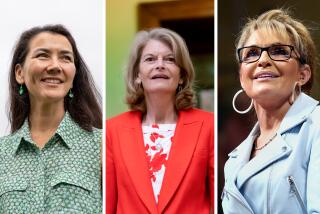Share the Wealth in Iraq
- Share via
What do Alaska and Iraq have in common? No, not climate. And no, not wildlife -- though it is conceivably possible to mistake a camel for a moose. The answer is oil. Which is why the Bush administration is thinking, quite cleverly, of using Alaska’s Permanent Fund as a model for distributing wealth in Iraq.
The Alaska program sets aside 25% of the state’s tax revenue from oil production. By implementing a revenue-sharing program like the Alaska fund -- which last year paid $1,540 to every man, woman and child who met residency requirements -- the administration could dispel one of the harshest charges against the war: that it was motivated by a desire to let the U.S. petroleum industry and international financiers plunder the desert nation’s most important product.
More important, it would quickly pump money into the hands of cash-starved Iraqi citizens. That in turn would help create small businesses and other financial ventures, diffusing the often anti-democratic rage spawned by economic helplessness. What more could the U.S. and Britain hope for?
The idea was originally floated by Steven Clemons, vice president of the centrist New America Foundation. Sens. Mary Landrieu (D-La.) and Lisa Murkowski (R-Alaska) are behind it, and Secretary of State Colin L. Powell indicated to lawmakers Wednesday that he was interested.
The payoff could be big. Oil sales in Iraq are expected to create about $15 billion to $20 billion a year in revenue once the nation, with U.S. and British help, restores production to prewar levels. This could triple if Iraq’s lush fields are fully exploited during the next decade.
Whatever Iraqi government comes to power will probably not be thrilled at the prospect of people getting money the state could have claimed for itself. But Iraqis need look no further than Saddam Hussein’s palaces to be skeptical of that attitude. By encouraging Iraq to give its citizens a stake in that to which they’re entitled, the U.S. would be enhancing the chances of democracy.
More to Read
Sign up for Essential California
The most important California stories and recommendations in your inbox every morning.
You may occasionally receive promotional content from the Los Angeles Times.













